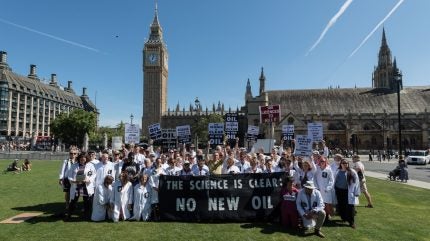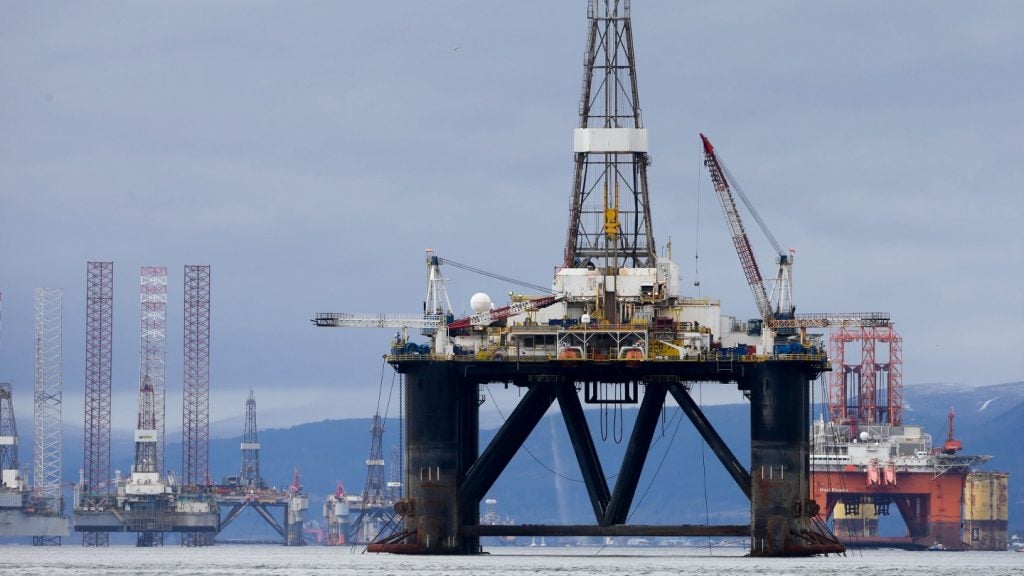
The UK government’s decision to approve 31 new licenses for oil and gas exploration last month – extending oil drilling in the North Sea for at least a decade longer than the country’s net zero deadline – was met with international condemnation.
In 2019, the UK became the first ‘major economy’ to pass a law to bring all greenhouse gas emissions to net zero by 2050.
Despite this, the current Conservative government authorised “hundreds of new North Sea oil and gas licences” last July, which failed to assess emissions produced by burning extracted fuel, Greenpeace and other environmental organisations argued.
These licenses will see the UK continue with oil drilling in the resource-rich North Sea as late as 2060 – a point of furious debate ahead of the UK elections on 4 July.
Labour pledges increase in windfall tax on North Sea profits
Election frontrunners the Labour Party plan to keep to the UK’s current targets of net zero by 2050, primarily by pledging to create a new ‘Clean Power Alliance’ to bring together a coalition of countries to tackle climate change.
Labour leader Keir Starmer has also pledged to establish GB Energy, a public energy company to lead renewable investments, a move “in line with global trends towards industrial policy and state involvement”, according to Paul Hasselbrinck, senior upstream analyst at GlobalData.

US Tariffs are shifting - will you react or anticipate?
Don’t let policy changes catch you off guard. Stay proactive with real-time data and expert analysis.
By GlobalData“Labour is seemingly focused on the prospect of governing rather than appealing to certain voter groups, given their large poll lead,” Hasselbrinck tells Power Technology’s sister publication Offshore Technology. “The upcoming government faces conflicting political and social priorities, limited fiscal space, and reluctance to raise taxes.”
Earlier this week, however, Labour said it would increase a windfall tax on North Sea oil and gas profits to 78%, at least until 2029. Current Conservative Prime Minister Rishi Sunak imposed the current 75% tax in 2022.
Along with Starmer’s pledge to end North Sea exploration, the move has met with uncertainty by oil and gas companies which already have licensed offshore projects underway.
These include Jersey Oil and Gas, Serica Energy and Neo Energy, which have delayed by a year their project at the Buchan oilfield, 193km north-east of Aberdeen, Sky News reported.
Starmer has “yet to decide on oil and gas production licenses”, Hasselbrinck adds, pointing out that Labour’s manifesto vaguely stated that fossil fuel production in the North Sea “will be with us for decades to come”.
In February, Labour came under heavy fire for ditching its policy of $28bn annual investment on green energy projects, including offshore wind farms and electric vehicles (EVs).
Incumbent Conservatives issue hundreds of new North Sea oil and gas licenses
The Conservative Party, which has held power since 2010, says it will stick to the UK’s 2050 net zero target.
However, Sunak has promised an “affordable and pragmatic” approach without any new green levies or increased windfall taxes, prompting questions over how green energy projects will be funded.
“The Conservatives have attempted to frame the issue as a trade-off between long-term environmental protection versus immediate cost-of-living concerns and economic growth,” Hasselbrinck tells Offshore Technology.
He adds: “In this strategy, they appeal to people who could face higher taxes to fund investments, consumers who could be affected by regulations, and fossil fuel industry workers in the north of the country.”
The Tories have become increasingly radical, U-turning on various climate pledges to appeal to traditionally older, more conservative voters as Sunak has watched his popularity dip drastically in the polls.
One such decision was to push back the deadline for selling new petrol and diesel cars from 2030 to 2035. Climate scientists, automobile and energy businesses, and several senior Conservative members – led by former Prime Minister Boris Johnson – criticised the move.
Despite some “increased transparency with the release of new details on its net zero plans through the Carbon Budget Delivery Plan (CBDP), policy development remains slow”, according to Hasselbrinck.
The Climate Change Committee, an independent body which assesses emission targets, has stated that its confidence in the UK meeting its medium-term objectives has decreased over the past year.
Best of the rest?
Aside from the Liberal Democrats’ brief stint in coalition government with the Conservatives from 2010 to 2015, it has been virtually unheard of for any party other than Labour or Conservative to hold office since the end of the First World War.
The Lib Dems, the UK’s third-largest party, has promised to “take the action needed now” to reach net zero by 2045. Ed Davey’s party also says it will adhere to the UK’s Paris Agreement commitment to reduce emissions by at least 68% by 2030. The Lib Dems’ main policy has been to back a one-off windfall tax on the profits of oil and gas companies.
A crucial player in opposition will be the Scottish National Party (SNP), given Scotland’s key geographic role in North Sea drilling and offshore projects.
In the first televised TV debate ahead of 4 July, SNP First Minister John Swinney warned failure to deliver a “just transition” would create an “industrial wasteland” in the north-east of Scotland.
He did not, however, confirm whether the SNP would restrict new licenses in the North Sea.
Expectedly, the Green Party has campaigned on ambitious environmental pledges and been a vocal critic of fossil fuel exploration and production in the North Sea. The left-wing Greens have only ever held one seat in the UK (Brighton Pavilion) under then-leader Caroline Lucas, and are only projected to win one or two seats on 4 July.
Now led by provocative Brexiteer Nigel Farage, Reform UK has pledged to completely scrap the UK’s net zero pledges and fast-track North Sea licenses.
The right-wing Reform UK was formed in 2021 as a relaunch of Farage’s Brexit Party, in turn derived from the UKIP party.

Amid flagging fossil fuel pledges in not only the UK, but also in Germany, Norway, the Netherlands and Denmark, the countries most active in the North Sea, there is clear temptation for political figures on the brink of power to further dilute and delay such policies.
“None of the major North Sea fossil fuel countries are on track to meet their 2030 climate pledges,” Hasselbrinck concludes.
He adds: “Despite potential regime changes to capture windfall profits, incentives to invest in oil supply remain strong given the global pace of the energy transition.”
The attention of offshore businesses and climate organisations around Northern Europe now turns to the UK elections on 4 July – and, more crucially still, the initial North Sea energy policies passed by the new government.


